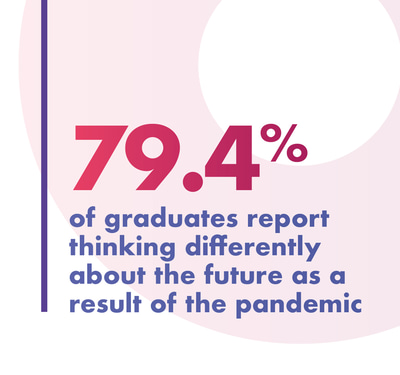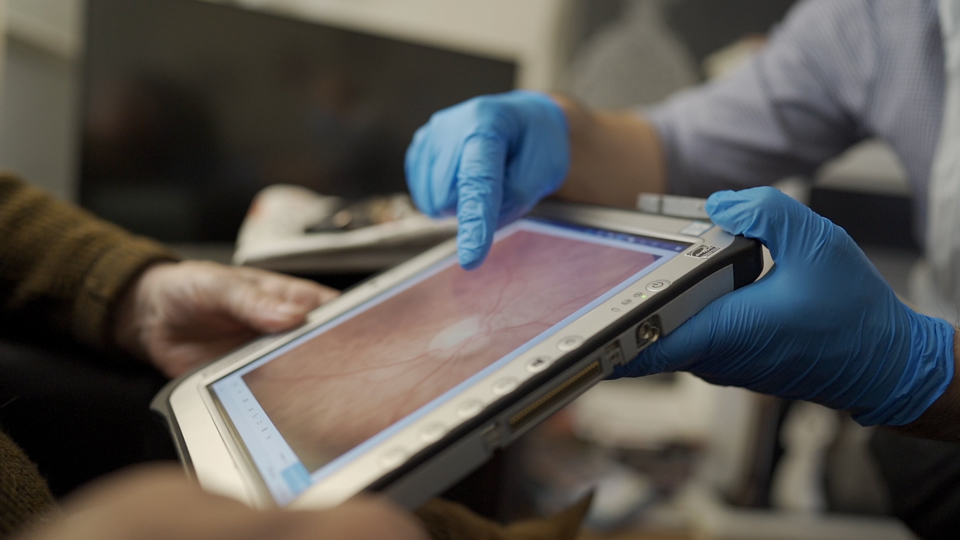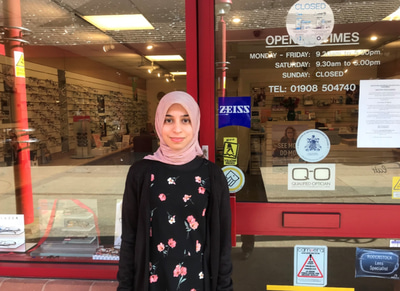- OT
- Life in practice
- Career development
- Placements, progression, and the pandemic – the evolving challenges of COVID-19 for student optometrists
COVID-Generation
Placements, progression, and the pandemic – the evolving challenges of COVID-19 for student optometrists
Seven months on from the last report on the impact of the pandemic on student and pre-reg optometrists, OT considers how the situation has changed, and what challenges remain

06 October 2021
On the face of it, aspects of studying and training seem to have settled for students and pre-reg optometrists since OT last explored the impact of the pandemic on this portion of the profession.
University clinics have been able to go ahead over the past year, with strict protocols in place, and the College of Optometrists confirmed in July that 655 new optometrists had qualified since the start of 2021.
But just beneath the surface, pressures that built up during the pandemic continue to simmer and the potential for ongoing disruption continues to loom.
Placement problems
Luke McRoy-Jones, pre-reg optometrist and AOP Councillor, highlighted that the AOP’s student committee has identified continued concerns around placement availability and communication from employers, adding: “Understanding these concerns is a priority of the AOP and I would like to reassure students on this.”

Research from the graduate careers organisation, Prospects, of more than 3000 university and sixth form or college students, found that a quarter had lost their work experience opportunities as a result of the pandemic and only 17% had undertaken a placement in the past year.
Understanding these concerns is a priority of the AOP
Indy Ghuman, final year optometry student at Aston University and chair of the AOP student council, shared that pre-reg and work experience placement opportunities have felt limited as a result of the pandemic.
“I think COVID-19 has definitely reduced or diminished the opportunities. It has reduced the breadth of clinical experience you might be able to get,” he said.
“This makes it a bit more difficult for a student to find out what they want to do and what kind of optometrist they want to be,” Ghuman suggested. “So we might find that this current cohort of student optometrists are a bit more uncertain.”
Nick Hillman, director of think tank the Higher Education Policy Institute (HEPI), told OT: “There seem to be problems across the board, because employers have either downsized their staff, or they’ve been rushed off their feet trying to survive. Employers are more focused on short-term challenges than on the next generation.
“It’s very regrettable and not easy to fix, because who can blame employers for focusing on the day-to-day in the middle of a crisis?” However, experiencing a range of work settings is crucial for students, he shared, “to enable people to make informed decisions about the future of their lives.”
Hospital experience
Challenges in placement availability have affected students across the board, with the Association of Graduate Careers Advisory Services (AGCAS) finding that three quarters of graduates surveyed had noticed a fall in the number of available opportunities since March 2020.
Across the year, optometry students have highlighted the particular challenge of securing work experience and pre-reg placements within the hospital eye service (HES).
“The pandemic has opened a lot of students’ eyes to the value of the NHS and many are considering hospital pre-reg placements, which they might not have considered before,” Ghuman told OT. “That is a positive thing because it has really increased awareness of these roles.”
As awareness has grown, so too has competition in a time when hospitals are under increased pressure. Students report finding it difficult to obtain hospital experience.

Commenting on the provision of placements going forwards, McRoy-Jones told: “While the College of Optometrists has done an excellent job of ensuring an online alternative in the short-term, I feel the long-term goal should be to have in-person placements available again for all pre-reg trainees and at this time, the picture is not clear on whether this will be possible or how.”
Another difficulty is the cohort of optometrists working towards independent prescribing qualifications who also need HES placements, though the College and General Optical Council have introduced new policies with the aim of maximising clinical experience opportunities for IP trainees.
He shared: “This provision will be a key focus for the profession.”
Hospital insight: Moorfields Eye Hospital
Earlier this year, Moorfields gave an insight into the impact of the pandemic on the hospital and placements, with the hospital taking the difficult decision not to offer pre-reg placements for the 2021–2022 cohort in order to support the trainees in situ.
Sarah Canning, head of optometry and consultant optometrist, and Nathanael Anguige, principal optometrist and pre-reg supervisor, confirmed that the capacity for work experience placements at the hospital remains limited due to social distancing requirements.
The department has observed a reduction in the number of people wishing to undertake a placement, the optometrists noted, but added that there is a slow increase in the number of students returning to carry out placements.
They continued: “As optometry undergraduate course requirements have changed in response to the pandemic with studies mainly being delivered virtually, the requirement for students to attend for face-to-face placements has reduced.”
The hospital will be opening placements again for a new cohort of pre-regs to start in August 2022. Interviews took place in June, with the department seeing “an exceptionally high number of applications” for the four positions.
With all of the pre-regs living away from home, it has been important for the whole optometry department to check in and look out for them
The 2019–20 cohort have now completed their pre-reg year and qualified as optometrists and the newest cohort, who faced a delayed start, have “progressed brilliantly,” the optometrists shared.
Discussing how the experience has changed, they explained that more virtual teaching and training had been introduced, which has been well received “and is likely to stay in place for future years.”
Changes also included arranging month-long placements in practice, rather than one day a week as in previous years. Timetables have been made more flexible, with short-notice changes to allow pre-regs to work in the clinics they need experience in, or the patient numbers for, in order to complete their competencies.
“Our supervisors also increased the number of meetings with their pre-regs, to ensure that they have the opportunity to raise and address any areas of concern or difficulty,” Canning and Anguige shared. “With all of the pre-regs living away from home, it has been important for the whole optometry department to check in and look out for them, ensuring that they feel well supported, as there have been times in the year when they haven't been able to travel home.”
Experiencing hospital optometry: advice from Moorfields
“Moorfields runs a core resident programme, which is specifically designed for optometrists who are newly qualified but who do not have a lot of hospital exposure. The programme trains optometrists in the core optometry areas - refraction, low vision and contact lenses, to enable optometrists to develop within a hospital role.
“If optometrists really are keen to work in hospital, it is usually fairly evident at interview stage by seeing how passionate and enthusiastic candidates are, and by seeing how much voluntary work or work experience they have already managed to achieve in a hospital.”
“For current pre-reg or early career optometrists, my advice would be to make sure that you have regular meetings with your supervisor or line manager to ensure that any worries are raised at the earliest opportunity and any potential gaps in knowledge are identified.
“Consequently, this helps to reduce unnecessary stress on the pre-reg or early-career optometrist at a time when they may have lower confidence in their abilities or knowledge. Even now, after a number of years being qualified, our staff here at the hospital are always asking for opinions and advice, and it is one of the joys of working in a hospital that we are surrounded by multi-disciplinary teams with a wealth of knowledge and experience to learn from. Nobody knows everything and it is always better to ask questions and learn.”
Exploring new areas
Though students might feel a sense of limitation when trying to secure optical placements and experience, this could lead them to consider alternative paths to their career goals.

“It might breed opportunity for that individual to seek out other ways of widening their experience,” Ghuman suggested of the challenges. “That might be engaging on extra courses and further learning, or exploring different settings, such as maybe domiciliary where we’ve seen a big demand. A lot of students might be thinking that this is an area they would like to consider, that they might not have before.”
Simon Raw, optometrist at OutsideClinic, told OT the company has seen a significant increase in the number of students who are interested in learning more about domiciliary eye care. This is fortunate, he said, “as the sector is experiencing major growth, thanks to an ageing population, where people aim to continue to live independently in their own home.”
To meet this increasing need, more optometrists will be needed in domiciliary, Raw said: “It is vitally important therefore, that we give students experience of the sector at an earlier stage, so they know they have more options to consider when they qualify.”

Raw continued: “We need to make domiciliary placements the norm within the pre-reg year if we are going to find the capacity to meet the increased demand in this exciting line of work.”
This is something the provider is hoping to take the lead on over the next 12 months, Raw shared, working with its local university.
We need to make domiciliary placements the norm within the pre-reg year if we are going to find the capacity to meet the increased demand in this exciting line of work
Progression in pre-reg
“I think the 2019 graduates have faced the biggest delays as a result of the pandemic,” McRoy-Jones shared, as face-to-face visits were paused in early 2020 due to the pandemic, before virtual assessments were introduced. “This group of graduates spent around 18 months to two years on the Scheme, rather than the traditional 12 months.”
Many 2020 graduates also faced short-term delays of around three to six months in starting placements, McRoy-Jones added, “due to the backlog of trainees from the previous cohort.”
“This meant that instead of enrolling in July, most enrolled between September 2020 and January 2021.” He pointed out that these delays can have both financial, and wellbeing effects on those trainees who are earning a pre-reg salary and perhaps staying away from home for longer periods.
Now on the Scheme, however, he suggested that many have been able to progress as normal.
Important to remember, though, is that a number of graduates amongst both cohorts lost their pre-registration placement due to the pandemic. “While only a small proportion of trainees were affected by this, the effects were obviously awful for those involved,” McRoy-Jones said.
Having begun her pre-reg placement this summer, Fatema Master, an AOP student representative, reflected that the process has been smooth.

Now in practice, she has seen some of the ongoing effects of the pandemic on the pre-reg journey commenting: “because of the pandemic, everything has been pushed back.”
Though she was able to enrol for the Scheme for Registration in August, she suggested that, “It feels like it has delayed when I can start testing and doing my clinics.”
But while it feels like progression has been slower in some ways, Master added, “being in practice, all the staff have been really helpful and my supervisor has kept in touch with me to tell me what is happening and make a plan for when I could start testing.”
The sense of a slowing of progress was observed by Graduate Market Trends which found, with experiences and opportunities withdrawn or delayed, “graduates and college leavers alike expressed a sense of plans being delayed or ‘on hold,’ leading to feelings of being in limbo.”
The College of Optometrists: the flexibility of the Scheme for Registration
Alistair Shaw, head of assessment for the College of Optometrists, explained that, at the time of writing, over 94% of the cohort of students graduating in the 2020–2021 academic year had been enrolled on the Scheme for Registration, comparing “favourably” with 96% of the 2019–2020 graduating cohort.
Speaking to OT in August, Shaw said that enrolment for the summer’s graduates had already begun, adding that over the proceeding four weeks, 250 trainees had already been enrolled in a variety of practice settings.
Commenting on the perceived delays caused by the pandemic, Shaw said: “A key characteristic of the Scheme’s design is its flexibility. There is not one fixed enrolment date or point – trainees can enrol at any point and will have two years and three months from their individual start date in which to complete the Scheme.”
He added that work-based assessments take place all year round, with OSCEs four times a year, “so that trainees can follow a timescale that suits them, their employer and, in the case of some integrated courses, their university.”
Asked about the potential impact that any perceived delays could have for pre-regs, HEPI director, Hillman, said he felt positive: “One of the lessons from the crisis, when it comes to education, is that people are quite resilient when they’ve got an ambition in mind. And you don’t go into optometry lightly. It’s a really big decision to enter an important profession like this.”
Getting experience in the practice ahead of beginning pre-reg has had its value. Reflecting on her experience of joining her practice ahead of enrolling on the Scheme, Fatema Master shared: “I have seen how the practice works, I’ve got used to what lenses they use, the spectacles and contact lenses, and what their systems are.
“In a way, I think it has worked out for the better, because I have got a lot of that knowledge which I think will help me in my clinics.”
Challenges across healthcare: dental training
Gaining required patient numbers has been a key challenge for dental graduates, who undertake a foundation training year in practice alongside assessments.
The British Dental Association (BDA) told OT the 2019–2020 cohort of graduates were the first to be affected by the pandemic when dental practices closed between March and June 2020.
In England, Health Education England adjusted some requirements for minimum numbers of treatments and introduced a special Outcome 6C – demonstrating the individual had reached the competency but not been able to fulfil the minimum treatments due to the pandemic, giving them two years to address the missing numbers. New employers received short-term funding for any training support needed.
In Northern Ireland, Wales and Scotland, individuals were signed off but provided with an additional personal development plan to work to in their next role.
For the 2021–2021 cohort of graduates in England, Wales and Northern Ireland, enough clinical activities could be provided to enable foundation dentists to meet most of the requirements and where there have been difficulties, a similar approach to last year was taken.
However, practices in Scotland did not return to the full breadth of treatments at the same time as other countries, affecting the number and types of treatment possible during training. As a result, it was decided that Scottish final-year dental students would not be graduating in the summer 2021, instead repeating the year, with the training for Scottish vocational dental practitioners also extended by up to a year.
“At the time of writing, it is too early to say what the situation with Scottish dental school graduations will be in 2022 and how this will affect vocation training. But the BDA will be watching the situation closely and lobby for the necessary support at the appropriate time,” the association said.
Opportunities for employers
With students and graduates affected by the pandemic, experts have highlighted the role that employers could play in providing support.
Research from AGCAS and the University of Southampton found that graduates would like more support from employers during recruitment. Dr Michael Tomlinson, associate professor at the University of Southampton, commented that employers hold an “important position” in supporting graduates’ transitions, adding: “Employers can build on good practice in helping facilitate significant forms of work experience and work-integrated learning, as well as offering effective initial training, internships, and work opportunities.”
Similarly, in its report on the impact of the pandemic on early careers, Graduate Market Trends suggested that to support new entrants into the job market who may not have had the same levels of experience as previous cohorts, “what is particularly important is the preparation for induction and onboarding into employment.”
I think my message for the profession would be that the next generation of optometrists should be supported and given opportunities wherever possible
McRoy-Jones highlighted that for those in training, the pandemic has brought some “significant challenges, uncertainty and worry, as we’ve had to adapt quickly to new ways of working in a changeable climate.”
“I think my message for the profession would be that the next generation of optometrists should be supported and given opportunities wherever possible,” he shared, adding: “I would like to praise many across the profession, employers, and those within training and education for their commitment to trainees and their desire for wanting them to progress.”
In practice with: Valli Group
“Due to the pandemic, the last cohort of students experienced delays and frustrations in finding or securing placements. It was important to us to offer support and as soon as we were able to progress, we held initial Zoom interviews to establish and match the candidates to the practice team. We introduced the applicants to the relevant supervisors and held trial sessions to ensure the relationship and dynamic worked well. We currently have two pre-reg students who are progressing well with the support and encouragement of their supervisors.
“Instead of starting their pre-reg in August or September 2020, due to the delays, they started in February 2021, which will have a knock-on effect for the next cohort. We are however confident we will be able to continue to offer pre-reg placements in the coming years and that delays will eventually catch up.”
Reflecting on her experience, Master highlighted that the communications from her pre-reg placement and supervisor had been helpful in keeping her updated and creating a plan.
This is something she recommends others could do to ease some of the challenges pre-regs face in transitioning to practice following the pandemic.
“It is difficult for supervisors too, but it is good to have guidance and know how we are going to plan for the future,” she shared. While there might be some delays in the process, she suggested: “it is good to plan when you might be able to start testing, so you know what you should be doing now in order to prepare and progress.”
To support those who have struggled to find a placement or are preparing applications, Master suggested employers could share more information and tips on what students should be doing to succeed.
Expanding options: OutsideClinic’s view
“We really believe that domiciliary placements need to be an option for all pre-reg students, and we would of course contribute to the student’s pre-reg salary if it meant that we could give more people access to the domiciliary eye care experience.”
"While domiciliary pre-reg placements are technically available right now they aren't signposted enough and so students have to make a special effort to incorporate this into their placement year.
“We believe that domiciliary placements should be mandatory or at least easy-to-access in your pre-reg year to help students develop into more rounded optometrists and have a better idea of their career options, but we need to work together as a profession to achieve that."
Don’t underestimate the students of COVID-19
The long-term goal
While there is apprehension around what could come next, the students suggested that some of the alterations made during the pandemic could lead to positive change.
“The pandemic has further demonstrated the importance of optometry as an accessible primary healthcare profession,” McRoy-Jones said. “Strained hospital departments, NHS capacity and resources have been further amplified by the pandemic and I feel that many of the changes we were due to see, outlined in the NHS Long Term Plan, may actually begin to arise much sooner.”
“I think that this will create a lot of opportunity for those currently studying, as well as qualified optometrists, to upskill and take on a greater role in the diagnosis and management of eye disease,” he continued.
Speaking to OT, Hillman said he felt optimistic about the way universities, students and graduates have adapted to the crisis – particularly the increased desire for further qualifications.
“Although employers might have had to take their eye off the long-term because they have needed to survive the short-term, individuals have not. They have kept their eye on the long-term prize of being well educated, training for a profession or enrolling in postgraduate study,” he observed. “The crisis hasn’t stopped them from being optimistic about their capabilities or potential.”
Reflecting on their experiences of studying and training through two years like no other, the students were positive and grateful for support offered by the profession.
Entering his final year and preparing for the move into pre-reg, Ghuman reflected: “It’s exciting to know that what you’ve been working for, through university exams, through the pandemic, even during A levels and GCSEs, is all going to come to a head now as you make that big leap to qualify.”
Sharing a message for the profession, he said: “Don’t underestimate the students of COVID-19.
“I think it’s bred a very resilient group of early career optometrists. They will have a very different set of skills which are unique, and that’s only going to be a good thing despite the surrounding disruption to their education.”
AOP students: my journey
Indy: “This is my experience, and I am owning my experience – the highs and the lows. I think the most important thing is that you have gone through it together with your peers, your friends, your lecturers. Despite your experiences, you have worked as a team, you are coming through the other end.”
Fatema: “I’m excited, because it is one step closer to being an optometrist. It’s a bit scary putting it into practice, but I suppose it is about getting used to it and having that experience.”
Luke: “Looking back and considering how far I’ve come in terms of learning and experience, I am proud of where I am today. This is what defines my pre-registration journey and I am optimistic for my future career. I think the fact that I’ve ultimately been able to progress through the Scheme, despite the events of the past 18 months, is positive.”
AOP support for students and pre-registration optometrists
- Students and pre-reg members can use the AOP’s Pre-reg register to list their availability for a placement
- OT’s education library hosts OT’s skills guides along with archived CET and CPD articles, covering a range of topic areas
- The Peer Support Line offers a free and confidential helpline for members and non-members at any stage of their career to discuss their problems with a trained peer. The line can be accessed on 0800 870 8401
- The AOP’s employment team is available to support and advise AOP members on pre-reg contracts and employment law and can be contacted on [email protected]
- For wellbeing tips and advice, why not check out OT’s Instagram Guide on student wellbeing?
- The AOP has recently launched its new mentoring programme, supporting newly-qualified optometrists to improve their understanding, skills and knowledge, while growing in self-confidence and working towards their development goals.


Comments (0)
You must be logged in to join the discussion. Log in